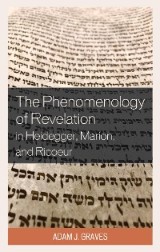Details

The Phenomenology of Revelation in Heidegger, Marion, and Ricoeur
Studies in the Thought of Paul Ricoeur
|
CHF 45.00 |
|
| Verlag: | Lexington Books |
| Format: | EPUB |
| Veröffentl.: | 26.08.2021 |
| ISBN/EAN: | 9781793640581 |
| Sprache: | englisch |
| Anzahl Seiten: | 256 |
DRM-geschütztes eBook, Sie benötigen z.B. Adobe Digital Editions und eine Adobe ID zum Lesen.
Beschreibungen
<p><span>The Phenomenology of Revelation in Heidegger, Marion, and Ricoeur</span><span> provides a critical framework for understanding the phenomenology of revelation through a series of close readings that serve as the basis for an imagined dialogue between Martin Heidegger, Jean-Luc Marion, and Paul Ricoeur. Adam J. Graves distinguishes between two dominant approaches to revelation: a “radical” approach that seeks to disclose a pre-linguistic experience of revelation through a radicalization of the phenomenological reduction, and a “hermeneutical” one that characterizes revelation as an eruption of meaning arising from our encounter with concrete symbols, narratives, and texts. According to Graves, the radical approach is often driven by a misplaced concern for maintaining philosophical rigor and for avoiding theological biases, or “contaminations.” This preoccupation leads to a process of “counter-contamination” in which the concept of revelation is ultimately estranged from the phenomenon’s rich historical and linguistic content. While Ricoeur’s hermeneutic phenomenology may do a better job of accommodating the concrete content of revelation, it does so at the price of having to renouncing the kind of “presuppositionlessness” generally associated with phenomenological method. Ultimately, Graves argues that a more nuanced appreciation of the complex nature of our linguistic inheritance enables us to reconceive the relationship between revelation and philosophical thought. </span></p>
<p></p>
<p></p>
<p><span>Adam Graves presents a new framework for understanding the importance of the concept of revelation in the development of phenomenology while also charting a path towards a more fruitful understanding of the relationship between reason and revelation, one that is rooted in a deeper appreciation of the complexities of our linguistic inheritance. </span></p>
<p><span>Preface</span></p>
<p><span>Acknowledgements </span></p>
<p><span>List of Abbreviations </span></p>
<p><span>Introduction. A Battle Cry: Reason, Revelation and the ‘Theological Turn’</span></p>
<p><span>Chapter 1. Retracing the Turn: Revelation and the Two Faces of Phenomenology</span></p>
<p><span>Chapter 2. Phenomenology, Theology and Counter-Contamination in Early Heidegger </span></p>
<p><span>Chapter 3. Marion’s Radical Revelation: Givenness and the Anonymous Call </span></p>
<p><span>Chapter 4. Ricoeur’s Hermeneutic Phenomenology of Revelation: The World Reconfigured </span></p>
<p><span>Conclusion. Language, Reception, Contingency</span></p>
<p><span>Epilogue. In the Beginning Was the Word </span></p>
<p><span>Bibliography</span></p>
<p><span>Acknowledgements </span></p>
<p><span>List of Abbreviations </span></p>
<p><span>Introduction. A Battle Cry: Reason, Revelation and the ‘Theological Turn’</span></p>
<p><span>Chapter 1. Retracing the Turn: Revelation and the Two Faces of Phenomenology</span></p>
<p><span>Chapter 2. Phenomenology, Theology and Counter-Contamination in Early Heidegger </span></p>
<p><span>Chapter 3. Marion’s Radical Revelation: Givenness and the Anonymous Call </span></p>
<p><span>Chapter 4. Ricoeur’s Hermeneutic Phenomenology of Revelation: The World Reconfigured </span></p>
<p><span>Conclusion. Language, Reception, Contingency</span></p>
<p><span>Epilogue. In the Beginning Was the Word </span></p>
<p><span>Bibliography</span></p>
<p><span>Adam J. Graves</span><span> is professor of philosophy at Metropolitan State University of Denver. </span></p>

















